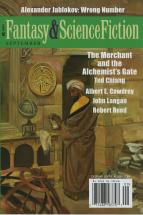“Envoy Extraordinary” by Albert E. Cowdrey
“Atalanta Loses at the Interpantheonic Trivia Bee” by Heather Lindsley
“Episode Seven: Last Stand Against the Pack in the Kingdom of the Purple Flowers” by John Langan
“Requirements for the Mythology Merit Badge” by Kevin Haw
“If We Can Save Just One Child…” by Robert Reed
“The Merchant and the Alchemist’s Gate” by Ted Chiang
“Wrong Number” by Alexander Jablokov takes place at a more-than-average auto body shop. When she gives a purposely wrong phone number to a man that she wishes she got to know better, Stephanie discovers that said shop operates on more than just carburetors. The mechanics there actually tweak coincidence so that the past can be changed. I loved the atmosphere in this story—the lazy, philosophizing car mechanics, the snappy, revealing banter among Stephanie and others—but characters’ motivations remained hazy for me. Was Stephanie trying to get her man? Or was it a revenge tale? No matter how engrossing the setting and promise, I couldn’t care very much because I didn’t know why people were doing things.
From the moment that you read that the protagonist Khartoum of “Envoy Extraordinary” is with an intergalactic corps, abbreviated UNIDIP, you know that Albert E. Cowdrey is gearing up for jokes at the diplomatic bureaucracy’s expense. This dryly funny short sends Khartoum on a mission to mollify the repulsive tyrant, King Drax, so Drax will neutralize his pirate fleet. Rather than compelling drama, this piece runs on a series of connected vignettes skewering the doublespeak and politicking of the diplomat’s trade. After reading this story, I can say with certainty and with a chuckle that I do not have the skills or desire to be a diplomat!
“Atalanta Loses at the Interpantheonic Trivia Bee” by Heather Lindsley holds a special place in my heart because it provides a delicious, lighthearted riff on the ancient Greek myth of Atalanta and Hippomenes, who distracted her with golden apples to win her affection. Not just for mythology dorks, though, this story, which has modernized godheads from a variety of pantheons competing in a quiz show, can be enjoyed by anyone who enjoys clever and allusive writing. Lindsley evens out the myth a bit by giving Atalanta an adequate reason to love Hippomenes besides mere fruit; I do wish the consequences of his literally gut-wrenching sacrifices had been explored more, but I suppose such an excursion into more serious territory would have imbalanced the pitch-perfect themes.
“Episode Seven: Last Stand Against the Pack in the Kingdom of the Purple Flowers” by John Langan has a plot that comes straight out of a recent zombie flick [think 28 Days Later] or maybe TV show [Buffy the Vampire Slayer]. Adolescent Wayne and pregnant Jackie flee from a pack of werewolf-like things across a deserted, post-apocalyptic landscape. The story operates brilliantly on two levels. One is the straightforward narrative of events, conveniently in boldface. The meat of the story occurs in parentheses, where Langan dives beyond the trite tropes of lone humans vs. monsters to get into both Wayne’s and Jackie’s streams of consciousness (mostly Jackie’s). There may be no new plots under the sun, but each character’s experience of the old stories feels fresh and new, and it is this immediacy, this novelty, that Langan’s story brings us.
“Requirements for the Mythology Merit Badge” by Kevin Haw takes the modern reinterpretation of old agrarian, pagan faiths to provocative ends. What if such religions flourished and blossomed? What if they became…well…real? It’s hard to write a story in an instruction format, but Haw pulls it off with a low-key, clever punch.
In the near future where “If We Can Save Just One Child…” by Robert Reed is set, human cloning is an accepted occurrence, but one type of duplication is illegal: when someone covertly steals another’s genetic material and makes a clone without the original’s knowledge or consent. So, is Gary Olsen a creepy child-stalker and illegal cloner…or is he stalking the illegal cloners themselves in an attempt to save kids? This mystery drives the simple story, which, aside from this question, has little going for it in terms of character development or suspense. The ending moves directly out of fiction and into flat polemic, depriving “If…” of the promise of its interesting premise. I’ve read stories that I did not like in F&SF, but I have not read one of poor quality until this one, which made me feel as if I were reading an editorial rather than a story.
Ted Chiang’s “The Merchant and the Alchemist’s Gate” picks up on the theme of John Langan’s of the story behind a story. Let me just say that Chiang knows his Arabian Nights; he presents “The Merchant…” with all the poetic flourishes, nested anecdotes, and self-reflexivity appropriate to that masterpiece of medieval Persian narrative. The complex, thoughtful format suits his subject matter well; the overarching story concerns a miraculous gate that transports the user back in time two decades. As various characters use the gate, cause and effect become confused; intriguingly enough, even as the past and future remain unalterable, the truth changes. More properly, the truth deepens in this touching and mature story.
